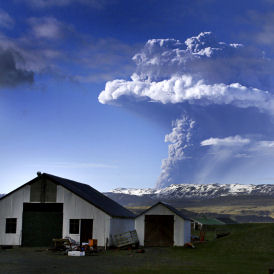Europe on alert for Iceland volcanic ash cloud
Europe is watching for any impact on its air routes after a huge volcanic eruption in Iceland. But an expert tells Channel 4 News there is unlikely to be a repeat of last year’s air travel chaos.

The source of the ash is a massive eruption at the Grimsvotn volcano, Iceland’s most active volcano. It occurred at the weekend, sending a vast plume of smoke and ash into the air. The cloud turned the skies dark in Iceland and had drifted over to the capital, Reykjavik, by Sunday evening.
The main airport in Iceland remains shut, although it could open later. There have been warnings the ash cloud could reach the UK by Tuesday.
However experts said that there was unlikely to be a repeat of the closure of airspace which took place last year when an eruption at the Eyjafjallajokull volcano caused havoc, grounding flights – including transatlantic flights – and costing the airline industry $1.7bn.
Airlines shut down operations over fears the ash could damage plane engines and cause accidents.
Only limited disruption likely
Despite the size of the Grimsvotn eruption, which spewed ash into the surrounding area, smothering cars and buildings, experts say it is unlikely air travel will be affected in the same way this time round.
“Grimsvotn is a more powerful eruption, spewing out 10-100 times more material per second than Eyjafjallajokull,” the Open University’s Dr Dave McGarvie told Channel 4 News.
“Evidence? The Grimsvotn plume reached 17km whereas Eyjafjallajokull reached only 9km. Plume height is largely controlled by the eruption height.”
But he said that a number of factors, including less “fine ash” in the eruption – which means it is less likely to spread – would mean less disruption.
“The wind pattern during the Eyjafjallajokull eruption was very unfavourable for the UK, and contributed strongly to the problem,” he added. Changes to flying regulations would also make a difference, he said.
“These have been changed since Eyjafjallajokull. There are new concentration bands which will apply to Grimsvotn, and these allow aircraft to fly when ash is present but still within very safe limits. The net effect will be considerably less disruption for Grimsvotn.”